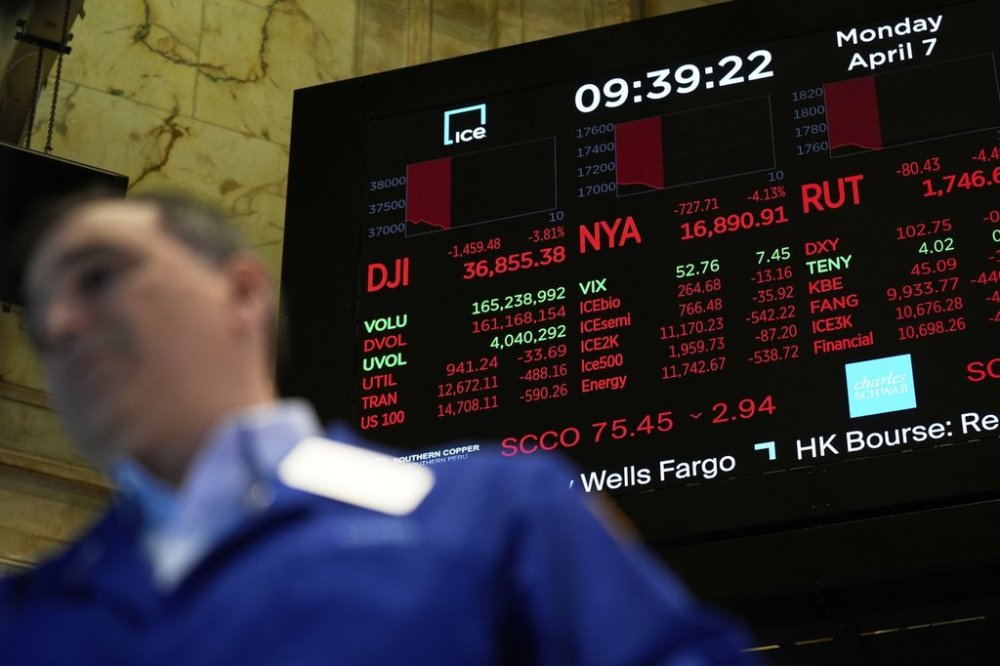Sticking with a retirement investing plan during times of volatility
Advertisement
Read this article for free:
or
Already have an account? Log in here »
To continue reading, please subscribe:
Monthly Digital Subscription
$0 for the first 4 weeks*
- Enjoy unlimited reading on winnipegfreepress.com
- Read the E-Edition, our digital replica newspaper
- Access News Break, our award-winning app
- Play interactive puzzles
*No charge for 4 weeks then price increases to the regular rate of $19.00 plus GST every four weeks. Offer available to new and qualified returning subscribers only. Cancel any time.
Monthly Digital Subscription
$4.75/week*
- Enjoy unlimited reading on winnipegfreepress.com
- Read the E-Edition, our digital replica newspaper
- Access News Break, our award-winning app
- Play interactive puzzles
*Billed as $19 plus GST every four weeks. Cancel any time.
To continue reading, please subscribe:
Add Free Press access to your Brandon Sun subscription for only an additional
$1 for the first 4 weeks*
*Your next subscription payment will increase by $1.00 and you will be charged $16.99 plus GST for four weeks. After four weeks, your payment will increase to $23.99 plus GST every four weeks.
Read unlimited articles for free today:
or
Already have an account? Log in here »
Hey there, time traveller!
This article was published 08/04/2025 (213 days ago), so information in it may no longer be current.
TORONTO – Three days of wild market volatility sparked by U.S. tariffs is enough to cause any investor stress, but for those in retirement, the plunge can be extra difficult.
Markets have taken a nosedive after U.S. President Donald Trump’s announcement of sweeping global tariffs last Wednesday.
While it can be worrisome to see markets drop around 10 per cent in a matter of days, experts emphasize the importance of not making any rash moves.

“First and foremost, absolutely avoid panic selling,” said Tony Maiorino, head of RBC’s Family Office Services team.
Retirees might think they don’t have the time horizon to recover from steep losses, but for many, the timeline is still relatively long so it’s important not to miss out on recovery days, he said.
“If you miss the best days, it dramatically impacts that rate of return.”
Portfolio rebalancing is important for everyone, but especially for retirees who might no longer be contributing to their investments and are relying especially on capital gains.
Given all that’s going on, it’s important to check in with your adviser because the news headlines might not be reflected so badly in your portfolio, Maiorino said.
Those trying to go it alone need to do a lot of research on the tax implications of various withdrawal strategies as equities get squeezed, and on which other savings vehicles make the most sense to tap instead.
Ideally, retirees should also have a cash buffer of between six and 12 months of living expenses so they don’t have to tap into their equity savings during a down time, and so they have the option of buying into the dips, said Maiorino.
Michael Pate, senior portfolio manager at Wellington-Altus Private Wealth Inc., says he’s been helping calm clients and reminding them that a balanced portfolio means they’re not taking the brunt of the equity losses in the news.
“It’s just a matter of talking them off the ledge and reminding them they have an asset allocation for a reason.”
For those who are truly losing sleep over the portfolio losses, he advises trimming their equity exposure to ease the stress, but he also emphasizes the importance of not panic selling and instead riding through the volatility.
“If you need to sell something, sell something and just reduce down, sell it to the sleeping point, so you can sleep at night and know you’ve done something.”
The market is still digesting the shock of tariffs that, as Pate notes, were not based on the tariffs of other countries but on a formula that “made absolutely no sense. It was made up out of thin air.”
But at some point, there will have to be some give on tariffs, he said.
“I just have a hard time seeing Trump flying the plane into the mountain, like, at some point he’s going to lift up. Somebody will get a hold of things and calm it down.”
As the situation eases, investors could take a look at their allocations, but such decisions shouldn’t be made because of short-term swings.
“You don’t make major changes to your asset allocation because of what’s happening over a two-day period or a two-month period or even a five- or six-month period,” said Pate.
“As long as you’re systematically changing that as you go over time, you’re constantly coming back to the right level.”
While Trump’s policies are creating dramatic threats to global trade that are resulting in serious recession fears, Maiorino said it’s important to remember to focus on the long term.
“Every time you’re in the midst of this type of market volatility, it feels different than the time before and the time before that,” he said
“We’re looking at a long-term view and these things will work themselves through.”
This report by The Canadian Press was first published April 8, 2025.


